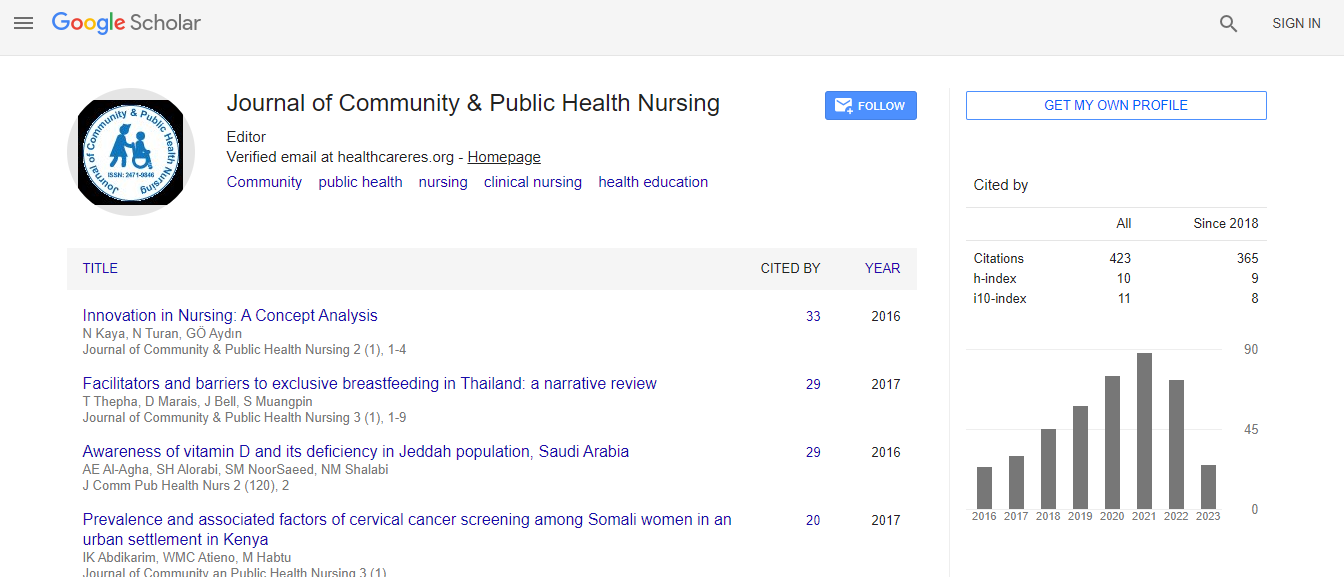Our Group organises 3000+ Global Conferenceseries Events every year across USA, Europe & Asia with support from 1000 more scientific Societies and Publishes 700+ Open Access Journals which contains over 50000 eminent personalities, reputed scientists as editorial board members.
Open Access Journals gaining more Readers and Citations
700 Journals and 15,000,000 Readers Each Journal is getting 25,000+ Readers
Google Scholar citation report
Citations : 739
Journal of Community & Public Health Nursing received 739 citations as per Google Scholar report
Journal of Community & Public Health Nursing peer review process verified at publons
Indexed In
- Google Scholar
- CiteFactor
- RefSeek
- Hamdard University
- EBSCO A-Z
- OCLC- WorldCat
- Publons
- Geneva Foundation for Medical Education and Research
- ICMJE
Useful Links
Recommended Journals
Related Subjects
Share This Page
The surplus project, nurses leading interventions to address food insecurity
Joint Event on 21st World Congress on Registered Nurse and Nurse Practitioner Meeting & Nursing Education and Management
Jennifer M Grenier,Nicole H Wynn
Rush University Medical Center, USA
ScientificTracks Abstracts: J Comm Pub Health Nursing
Abstract
Food insecurity is a social issue that is becoming more common across the nation. An individual identified as food insecure does not necessarily have enough food, but they may also have limited access to obtaining the food they need. Food insecurity is a social determinant of health. To address the issue of food insecurity in surrounding communities on the West side of Chicago, nurses developed The Surplus Project. This project decreases hospital food waste by donating food to local shelters to be redistributed to individuals who are in need. The World Health Organization defines, the Social Determinants of Health (SDH) are the conditions in which people are born, grow, live, work and age. The social determinants of health are mostly responsible for health inequities-the unfair and unavoidable differences in health status seen within and between countries (WHO, 2012). For the purpose of this presentation, the presenter will focus on food insecurity one of the social determinants of health and describe a nurse-led initiative designed to address food insecurity in one of Chicago’s underserved communities. Food insecurity is a growing health concern in the USA. As defined by the USA Department of Agriculture (USDA), food insecurity is “the lack of consistent access to enough food for an active, healthy life” (USDA, 2017). There is often a misconception where people believe food insecurity means not having any food at all, but in reality, food insecurity refers to more than just not having food. Food insecurity relates to access, quality and availability (USDA, 2017). As healthcare workers, we have a special responsibility to relieve hunger. The Surplus Project seeks to simultaneously reduce food waste and food insecurity throughout Cook County, IL through the development of a replicable and sustainable model for redistributing unserved cafeteria food to local families/individuals in need, while simultaneously operating as a model of service efficiency and environmental sustainability. The Surplus Project is an innovative way to reduce commercial food waste and increase the amount of safe, nutritious food for those in our community who struggle with hunger. Notably, this project answers the call to action issued by the AHA. Addressing food insecurity can have a great impact on the patient experience and patient outcomes. If food insecurity is managed and addressed, people may feel more empowered to improve upon their lifestyles.Biography
Jennifer Grenier graduated from Millikin with a Bachelors of Science in Nursing in 2002. Since graduating she has worked with the Rush University Medical Center System for 18 years. In 2012 she received her MSN from Lewis University. Jen graduated with her Doctorate in systems leadership from Rush University with her focus being on decreasing workplace bullying and incivility. She is also the founder of the Surplus Project which packages food from hospital cafeterias and donates to local food pantries. She has experience in medical-surgical, surgical ICU, liver transplant, telemetry, and is currently the director of the acute inpatient rehab hospital and the medical-surgical unit at Rush University Medical Center. She is a 40 under 40 Nurse Leader Winner as well as the recipient of the Community Effort Award given by Illinois Organization of Nurse Leaders. She was also awarded a $50,000 grant to expand her efforts on decreasing the food insecure in the Chicago Land area. Recently she was elected President of the Illinois Organization of Nurse Leaders (IONL). She lives in the Chicago Land area with her husband Scott and has two daughters Julia (12) and Abbi (9). She enjoys watching and coaching her daughters in softball and basketball and giving back to her community. Nicole Wynn MSN, RN-BC has been a Rush Nurse for six years, starting as a new graduate nurse, and currently is the Assistant Unit Director of a post-surgical care unit specializing in Spine Surgery and Ear Nose and Throat surgeries. She is currently working towards her doctorate in Transformative Leadership at Rush University. She has been part of the Rush Surplus Project since the beginning.
E-mail: Jennifer_M_Grenier@rush.edu

 Spanish
Spanish  Chinese
Chinese  Russian
Russian  German
German  French
French  Japanese
Japanese  Portuguese
Portuguese  Hindi
Hindi 
